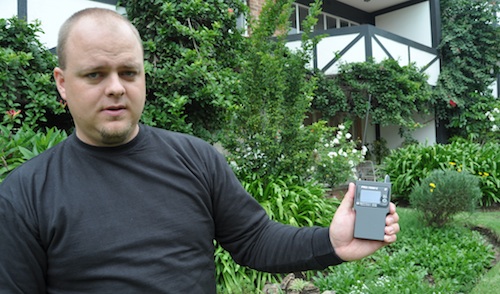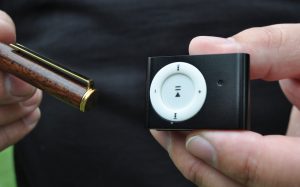
The espionage business, using hi-tech surveillance gadgets, is booming in SA as businessmen, politicians and even ordinary consumers turn to technology to spy on colleagues, business associates and even family members.
In James Bond movies, Q is the scientist who develops agent 007’s spy toys, from homing pills to rigged attaché cases. Etienne Labuschagne, MD of SpyCatcher SA, is a real-life version of Q. SpyCatcher develops and imports a wide range of surveillance equipment and other hi-tech gear.
And, says Labuschagne, business is thriving.
“A lot of people think this stuff is only available for governments, that it’s all just James Bond stuff,” he says. “It’s not. There is a very thin line between reality and living in a James Bond world. It’s very easy to get these things and very easy to use them.”
Labuschagne gave TechCentral a demonstration of a range of modern surveillance tools, which he says are used widely in business in SA for purposes as diverse as uncovering fraud in the workplace and spying on competitors and business partners.
SpyCatcher sells products such as a customised iPod Shuffle MP3 player that has a tiny built-in camera for video surveillance and an electrical power adapter and a computer mouse with built-in Sim-card slots and microphones for streaming audio conversations over the cellphone network.
Simply call the Sim card, and it starts streaming audio over the network. The devices are built in such a way that they don’t cause interference with speakers, so they are almost impossible to detect.

Then there’s a fully functional pen with a transmitter built into it that allows someone with a UHF receiver within a 500m radius to eavesdrop, even through walls. Because it looks and works like a pen, few people would suspect it was anything else.
Labuschagne understandably won’t reveal the names of SpyCatcher’s customers, but he says this sort of electronic eavesdropping is widespread in the corporate world.
The company custom designs surveillance gadgets, too. They can be built into desktop calculators and even wall sockets.
Popular products include cameras that can be activated remotely, and which store video on SD cards for later retrieval.
Gadgets that detect the presence of surveillance equipment are also popular. SpyCatcher sells handheld bug detection equipment that picks up devices that are emitting signals, or if a landline is bugged. And there are also point-to-point encryption systems to ensure landline and cellular calls and faxes are not being intercepted.
The company sells an infrared camera detector, for finding cameras that have been hidden away. “It will find any camera, whether it’s hidden or not. Businessmen like to take these when they stay at hotels to ensure no one is spying on them.”
The list goes on, including products that generate “inaudible white noise” to prevent illicit recordings and USB memory sticks with built-in audio recording equipment.
And, surprisingly, the technology is not expensive. “Surveillance technology like this has become affordable to literally everybody,” Labuschagne says.
Not all the equipment can be sold to the general public, though. Some signal jammers and high-end night-vision goggles, for example, are restricted to government use and Labuschagne says SpyCatcher can’t sell these systems without the right paperwork and certificates.
“When it comes to clients asking if it is legal or not, we don’t get involved. They need to consult their solicitor. A lot of these products are legal to buy and sell, but it’s how you use them that might be illegal,” he says. “We can’t be held accountable.”
Labuschagne demonstrated to TechCentral how tiny video cameras could be hidden in shirt buttons, or even in ties and wall screws. “You’ll be amazed at how prevalent this is in corporate SA,” he says. “I can’t say who our clients are but we have a lot of customers. People want to know when they go into a boardroom that they have maximum security.” — Duncan McLeod, TechCentral
- Subscribe to our free daily newsletter
- Follow us on Twitter or on Facebook


